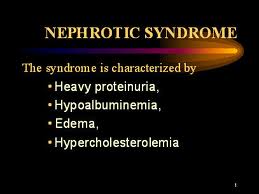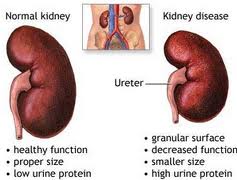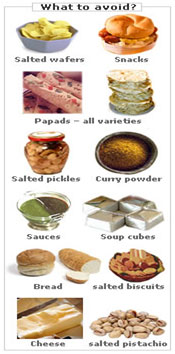Nephrotic Syndrome is a kidney disorder which is characterized by
- Abnormal protein leak
- Low levels of proteins in blood (due to protein leakage)
- Increased levels of lipid
- Swelling of body parts (called edema).

The term Nephrotic Syndrome is coined from two words: Nephros (in Greek) meaning kidney and Syndrome denoting a group of symptoms.
Nephrotic Syndrome is a set of symptoms related to kidney dysfunction, and not a disease, in and of itself. Nephrotic Syndrome is a disorder characterized by loss of proteins in the urine. In realism, Nephrotic Syndrome can be the first sign of various diseases that damage the kidneys, especially tiny blood-filtering units (glomeruli) in the kidneys, where urine is formed. This causes fall in the protein levels in the blood, and water to move into body tissues, causing swelling and bloating of body (edema/Oedema).
How common is the condition…
About two in every 10,000 people experience Nephrotic Syndrome. Nephrotic Syndrome can affect children and adults of any age. In children it is more frequently encountered between 2-5 years of age. The disease is more common in males than their female counterparts. The condition tends to be more common in families with a history of allergies.
This notorious condition becomes more distressing because of its chronic nature and tendency for frequent relapse and recurrence.
Homeopathic treatment for Nephrotic Syndrome:
Homeopathy has a well-defined and promising role to play in for the treatment of Nephrotic Syndrome. Experience based and evidence proven results indicate that the homeopathic treatment can offer following results:
- It can reduce the frequency of attacks of Nephrotic Syndrome
- It can reduce the duration of each episode of Nephrotic Syndrome
- It can reduce the attacks of frequent colds and infections, which in turn helps a great deal towards better control
- It can help in reducing the dependency on cortisone and cyclosporine.
Symptoms
Irrespective of what causes Nephrotic Syndrome, the following are the most common signs and symptoms of the condition. However, it should be noted that each individual might experience symptoms differently.
Symptoms of Nephrotic Syndrome may include edema (swelling of face, abdomen and body), proteinuria (passing of protein in urine), hypoalbuminemia (low level of proteins in blood), and hyperlipidemia (high amount of lipids in blood).
|
Nephrotic Syndrome Diet Foods that can be taken: |
|
| Cow’s milk, skimmed milk |  |
| Yogurt | |
| Wheat, cereals, sprouts, pulses and legumes such as tur dal, moong dal, rajmah, chana, lentils (masoor), etc. | |
| Eggs, fish, dry fish, chicken, lean meat, etc. | |
| Vegetables and fruits | |
| Soups, sauces, chocolate drinks, juices, etc (but with low sodium content) | |
| Wafers, popcorns, chutneys which are prepared in less salt. | |
| Moderate to low intake of vegetable oils, butter and mayonnaise. | |
| Noodles, spaghetti, pancakes, etc (low in salt) | |
|
Foods to be avoided in nephrotic syndrome: |
|
| • Excess of protein should be avoided because a very high protein diet may cause tubular damage to the kidneys as the kidneys will have to filter more of the proteins. But moderate protein intake (about 1 gm/kg body weight) is mandatory to compensate for the protein loss in the urine. |  |
| • High amount of fats should be avoided as the cholesterol and triglyceride levels tend to be high in patients with Nephrotic syndrome. The diet must be high in calories so as to conserve proteins, yet low in fats. Excess of oily food and saturated fats (ghee, margarine, etc) should be avoided. | |
| • Sodium in the diet should be minimum so as to prevent fluid accumulation and oedema. The foods that are high in sodium content and thereby should be avoided are: | |
| :. Salted wafers, popcorns, salted biscuits, snacks, chips, etc . | |
| :. Papads – all varieties | |
| :. Salted pickles, chutneys, curry powder – commercial preparations | |
| :. Commercial salad dressings and sauces. Soup cubes | |
| :. Bakery products, bread, biscuits | |
| :. Salted cashew nuts, pistachio, walnuts, peanuts | |
| :. Commercial cheese, preservative containing foods, noodle mixes, pastas | |
| :. Salted or canned meat | |
| :. Foods containing baking soda and ajinomoto | |





